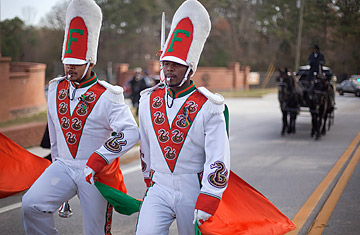
Members of the Florida A&M University band at a funeral for fellow band member Robert Champion, Nov. 30, 2011 in Decatur, Ga.
(2 of 2)
Peter McKay, a journalist and 1997 FAMU graduate, agrees that at times "FAMU has been soft-pedaled" in that respect. His FAMU Hazing Blog has urged Rattler Nation to own up to its often dangerous secret initiation rites: "Jim Crow is still a living memory for this community," he says, "but I think things have at least improved enough that we can start talking more openly about what's going on here." McKay, a former Wall Street Journal reporter and co-founder of the mobile-first news start-up Roscoe Labs in New York, also believes Scott was right to call for Ammons' suspension. "The cold underlying fact is that in this case a student died," says McKay, noting that in the recent alleged-child-sexual-abuse scandal at Penn State University, which didn't involve deaths, the school's president and its legendary football coach Joe Paterno were both removed.
McKay, like many other FAMU watchers, says a core factor is that "FAMU simply doesn't get enough attention paid to it" by the rest of Florida. "The old problem for the school was Jim Crow hostility," he says. "A big part of the problem now is neglect, letting things fester."
In that sense, FAMU's trajectory is typical of many historically black colleges in the U.S. In the 1950s, for example, the Florida legislature's racist Johns Committee harassed FAMU professors and students about their participation in the Tallahassee bus boycott. After the civil rights movement, Tallahassee let FAMU fall into disrepair until newly elected black lawmakers like Lawson helped spur its revival. As recently as 2006, Black Enterprise magazine rated FAMU the best U.S. college for African Americans.
Yet amid the well-deserved accolades, student hazing worsened — in 2001, a jury awarded a Marching 100 member $1.8 million after he suffered hazing-related kidney failure. Financial irregularities plagued the school as well. FAMU administrators insisted that the university was underfunded compared with other Florida institutions, and state higher-education officials complained that anytime they tried to scrutinize FAMU's accounts, college administrators cried racism. Either way — and there is some truth to each argument — FAMU got hurt. Champion's homicide (as well as another band hazing incident last month that led to three arrests last week) and the latest probe of possible malfeasance are all too unfortunate reminders that things need to change on both sides of campus walls.
A key question now is Ammons' status. Uhlfelder, who says he remains "a big FAMU supporter," believes that "despite the very real history of discrimination against [FAMU], it needs to be put under the same microscope as other schools." He also defends Ammons, who was hired in 2007 to fix FAMU's practices and has "made some tremendous gains." Ammons has indicated he'll leave his fate to the university's board, which is expected to announce its decision on Monday. After his meeting with Scott, Ammons told reporters, "We are all going to do what is best for the university." Whether he's suspended or not, what would be best is for people both inside and outside FAMU to put aside race and focus on a student's homicide.
